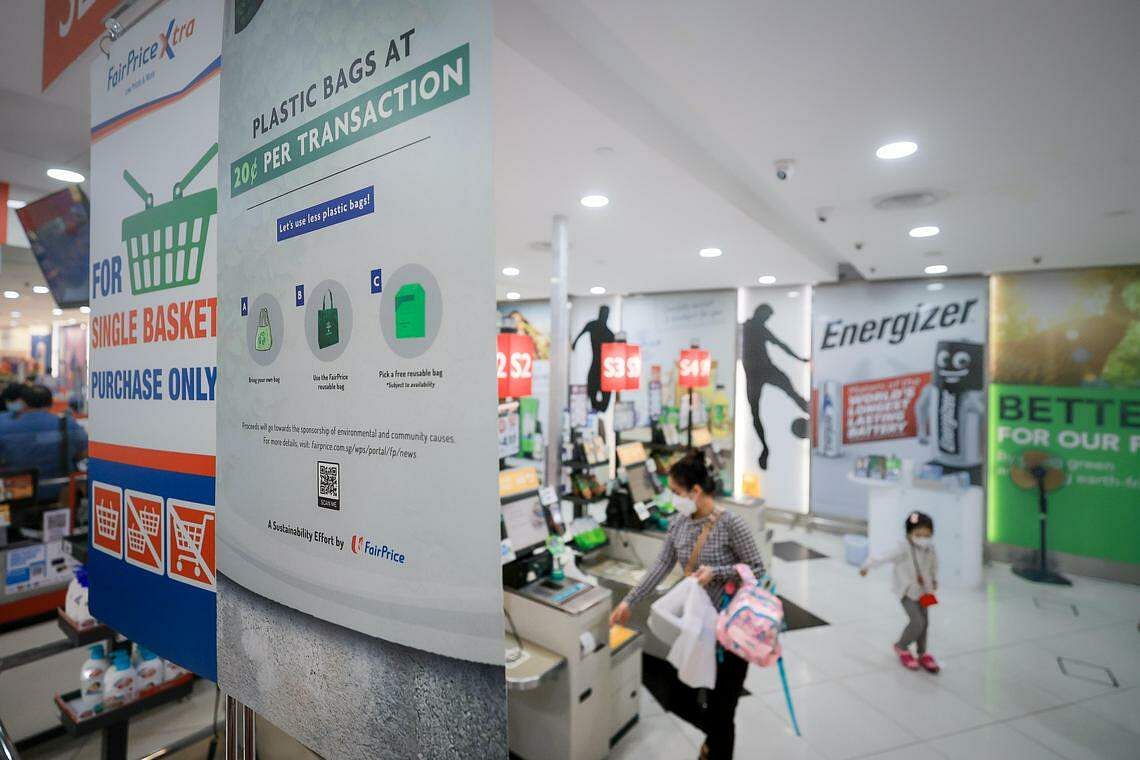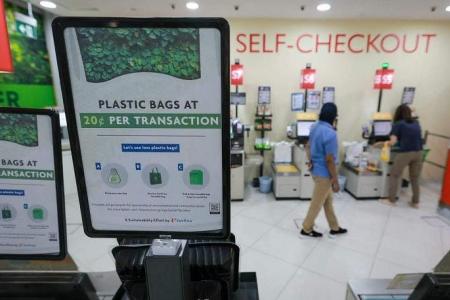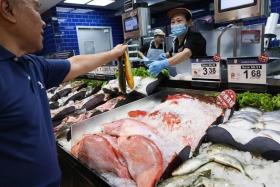7 in 10 shoppers will bring reusable bags when plastic bag charge kicks in on July 3
Whenever retiree Tan Mui San goes to the supermarket, she will grab the free plastic bags to pack her groceries before loading them into her reusable shopping bag.
“Using plastic bags from the supermarket to bag my refuse is an old habit which started decades ago, when we were encouraged to use plastic bags for throwing refuse into the rubbish chute,” said the 70-year-old single. She would also offer the bags to her friends for the same purpose.
But come July 3, when two-thirds of the supermarket outlets in Singapore start to charge at least five cents per plastic bag, she will stop taking such bags from the supermarkets, and instead buy them in bulk to bag her refuse.
Madam Tan plans to switch to using only reusable bags when shopping, as will 42 per cent of respondents in a Milieu Insight survey. They said they will start bringing their own bags only from July 3.
Of the 500 people who were surveyed on March 21 and 22, 67 per cent, or nearly seven in 10 shoppers, said they will use reusables at supermarkets from July, with 25 per cent of respondents already doing so now.
The survey also saw 14 per cent of respondents who currently make physical visits to shops most of the time saying they will shop online for groceries more frequently as a result of the plastic bag charge. Milieu Insight said the change is likely due to the convenience.
Of the 67 per cent of respondents who said they would bring their own bags from July, more than eight in 10 of them said they are nudged by the five-cent charge.
This was also the case in other countries such as the United States and those in Europe, said Associate Professor Hannah Chang from the Lee Kong Chian School of Business at Singapore Management University.
“Imposing a small fee for each plastic bag is highly effective across consumer segments, irrespective of consumers’ socio-economic characteristics,” she said.
But there will be shoppers who will continue to use supermarket plastic bags.
Assistant Professor Charlene Chen of the Nanyang Business School at Nanyang Technological University said: “People who purchase regularly will get desensitised to the pain of payment over time. If the payment remains minimal, they will remain desensitised.
“Increasing the charge is a tricky issue. It has to be a fair value. And that fair value may not be sufficient to create enough pain to nudge the change to refrain from plastic bags.”
The practice of charging for plastic bags has been around for a few years now, with 7-Eleven, Watsons, Guardian, FairPrice Xpress and 11 FairPrice supermarkets among those doing so.
In 2019, when seven FairPrice supermarkets and convenience stores started a plastic bag charge trial, seven in 10 customers at the supermarket outlets used reusable bags or refused plastic bags.
A FairPrice spokesman said recently: “There were initial challenges, such as having to manage customers who did not want to pay the charges. We expect greater customer buy-in over time.”
Eleven FairPrice supermarkets, including the outlet at Kallang Wave Mall, now charge 20 cents per transaction if a customer opts for plastic bags.
But this has led to some customers asking for more plastic bags since they are paying the extra 20 cents, noted Ms Tan Huileng, executive director of environmental group Zero Waste SG.
With smaller shops, the bag charge has shown promising results. At Guardian, which has been charging for plastic bags since April 2022, shoppers tend to take a bag only when they buy larger or more items.
In late 2021, Watsons introduced a bag charge of 10 cents per transaction for Mondays to Wednesdays. With 80 per cent of customers declining plastic bags, the charge became a daily one from September 2022.
Swedish furniture giant Ikea was the pioneer among retail chains in Singapore when it imposed a plastic bag charge in 2007. From 2013, it did away with carrier bags completely, and customers had to use their own bags or buy its signature blue Frakta bag for $1.

In the lead-up to the bag charge in July, environment organisations are engaging shoppers and increasing their access to reusable bags. Until end-April, Zero Waste SG will run weekend roadshows at selected supermarkets and place a bag rack there for shoppers to take and donate reusables.
Plastic-Lite Singapore has bag-sharing booths, called Bounce Bags, at four locations, including Bukit Merah Central and Heartbeat@Bedok, so residents can help themselves to donated bags before their shopping trips.
Its founder Aarti Giri said: “Since we generally don’t have the habit of carrying shopping bags from home, such bag-share points can help us ease into the habit of bringing reusables eventually.”
Thanks to positive responses from consumers, the FairPrice chain saved 57 million plastic bags in 2022.
Dr Ong Suan Ee, senior health systems researcher at think-tank Research For Impact, said: “This bodes well for the introduction of future policy changes in the same vein for other single-use plastics, such as legislating the charge for straws and food containers.”
Get The New Paper on your phone with the free TNP app. Download from the Apple App Store or Google Play Store now


